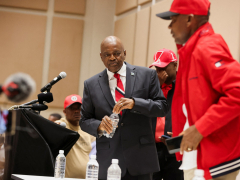On December 3, the Electoral Commission of Namibia (ECN) announced that Netumbo Nandi-Ndaitwah of the ruling South West Africa People’s Organisation (SWAPO) party, has emerged victorious in the disputed presidential election conducted from November 27 to 30.
It said Nandi-Ndaitwah won 57 percent of the votes, comfortably defeating her main rival, Panduleni Itula from the Independent Patriots for Change (IPC) party, who received around 26 percent. As such, Nandi-Ndaitwah, a former freedom fighter and current vice president, is now on the verge of making history as Namibia’s first female leader.
In the meantime, however, her party SWAPO disappointed in the parliamentary elections, barely holding on to its majority by winning 51 of the available 96 seats. By comparison, the party had secured 63 seats and a comfortable majority in the 2019 election.
Despite holding on to the presidency, SWAPO, the former liberation movement which has ruled Namibia since it achieved independence from apartheid South Africa in 1990, is clearly losing its electoral appeal. The party achieved its best-ever result in the 2014 election, securing 80 percent of the vote and a supermajority with 77 seats, but has been on a downward trajectory ever since.
There are many reasons why Namibians appear to be slowly moving away from the movement that secured their liberation.
Thirty-four years after independence, SWAPO is struggling to tackle a multidimensional poverty rate of 43 percent, address high unemployment levels, and provide essential services such as water and sanitation to long-marginalised communities. While the World Bank classifies Namibia as an upper middle-income country, it simultaneously identifies it as the second most unequal country in the world, as per the Gini index.
Through the years, Namibia has established a dual economy that has negatively impacted the socioeconomic aspirations of the poor and unemployed: an economic structure that features a highly developed modern sector, alongside an informal sector that mostly emphasises subsistence.
This, coupled with an apparent rise of corruption at the governmental level – which became evident in the $650m Fishrot scandal implicating senior figures within SWAPO – has turned many Namibians, and especially poor, young people most affected by high unemployment and lack of upward mobility, against the ruling party.
SWAPO, once seen by many in Namibia as electorally undefeatable and synonymous with the Namibian state, is now in rapid, possibly irreversible decline.
And in the Southern African region, Namibia’s liberation movement turned political party is not alone in this predicament.
In fact, one liberation movement in the region has already been ousted from power.
In October 30 elections, the citizens of Botswana consigned the Botswana Democratic Party (BDP) – the former liberation movement that had ruled the country since it achieved independence in September 1966 – to the opposition benches. After 58 uninterrupted years in power, the party managed to win only four seats in this year’s election.
The BDP’s defeat came on the back of years of poor economic growth and a 26.7 percent unemployment rate that turned the population against the government. The growing allegations of corruption directed at the BDP’s Mokgweetsi Masisi, who served as Botswana’s 5th president between 2018-24, did not help the party’s electoral chances, either.
In South Africa, meanwhile, the African National Congress (ANC) lost its parliamentary majority for the first time since the end of white minority rule in April 1994. In this year’s May general election, the liberation movement turned governing party’s vote share fell to a little over 40 percent, a sh





